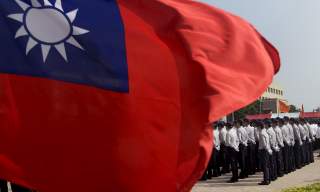Back to the 1950s on Taiwan?
There are two false premises at the heart of Gordon Chang’s argument in favor of breaking with current policy and extending an iron-clad U.S. security guarantee to Taiwan.
Talking tough and stoking rivalry sells newspapers, elevates TV ratings, increases the stock valuations of various defense companies, and maybe even wins an election sometimes, but rarely makes for good policy. In fact, nearly every modern U.S. president has entered negotiations with American rivals. Roosevelt surely did not want to sign away Eastern Europe to the USSR at Yalta, but he knew that he had no viable alternative. Eisenhower refused to escalate after the debacle of Dien Bien Phu. During the Berlin Crisis of 1958–59, this American president, who knew something about military conflict, said that the United States “should not go to war over the stamping procedure” for passage in and out of West Berlin. Kennedy, another combat veteran, repeatedly refused the bellicose recommendations of his advisors and found a negotiated solution to the Cuban Missile Crisis—even though the United States possessed vast (local) conventional and nuclear superiority.
Most ironic (and somewhat bizarre) is that Chang calls upon Henry Kissinger to support his point. Is Chang aware that Kissinger spent a good part of his career in public service trying to broker deals with Beijing? More to the point, these policies often in practice meant systematic downgrades of the U.S.-Taiwan relationship, including the departure of tens of thousands of U.S. troops from the island during the 1970s. Over the last two decades, Kissinger has been one of the primary American exponents of seeking negotiated solutions to the problems of world order together with Beijing. If Chang had ever bothered to read all five-hundred-plus pages of Kissinger’s authoritative tone On China, published in 2011, he would surely realize that the wise statesman would completely reject Chang’s radical proposal as long obsolete and contrary to the requirements of the emerging world order. Indeed, Kissinger writes: “From the time of the secret visit in July 1971, the Chinese conditions for normalization had been explicit and unchanging: withdrawal of all American forces from Taiwan [and] ending the defense treaty with Taiwan.” On the next page, moreover, he concludes that the United States “cannot [maintain ambiguity] indefinitely.”
Chang might check the date on the Kissinger book that he had quoted: 1957. The 1950s were indeed a difficult decade for U.S. national-security policy. In particular, that time (despite Eisenhower’s generally wise leadership), still witnessed a number of regrettable anti-Communist excesses, including the overthrow of several foreign governments, and the systematic surveillance and repression of internal, dissenting voices as well. If Chang wishes to turn the clock back to U.S. policies from that era, most Americans would rightly be strongly opposed. It was indeed, during that time, that the United States signed a mutual defense agreement with Taiwan that was later abrogated in the late 1970s in order to open relation with Mainland China.
At the end of this piece, Chang says that people might not be “hard-wired” for war, after all. It’s a hopeful sentiment, but alas I fear that is not true from historical experience. Since people are indeed hard-wired for war and great powers are likewise hard-wired for dangerous geopolitical rivalry, scholars (who know better) must stand up in the nuclear era and actively oppose anachronistic and biased hawks like Gordon Chang.
Lyle J. Goldstein is Research Professor in the China Maritime Studies Institute at the United States Naval War College in Newport, RI. In addition to Chinese, he also speaks Russian and he is also an affiliate of the new Russia Maritime Studies Institute at Naval War College. You can reach him at [email protected]. The opinions in his columns are entirely his own and do not reflect the official assessments of the U.S. Navy or any other agency of the U.S. government.

